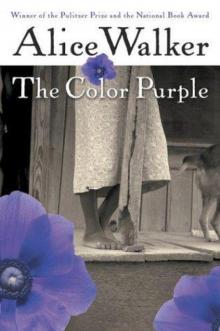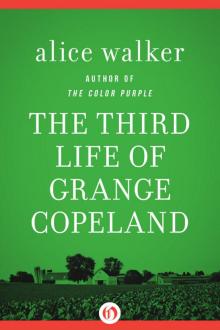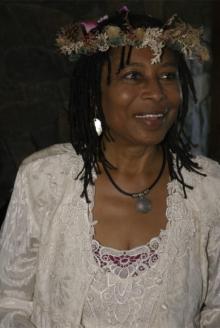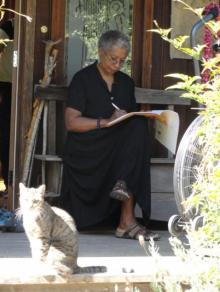- Home
- Alice Walker
The Temple of My Familiar Page 3
The Temple of My Familiar Read online
Page 3
Lying in bed later, exhausted from orgasms that shook her core, Zede traced round and round the black mole on Arveyda's right breast. They were both relaxed and frantic.
"It won't happen again," she said. "It can't."
Her lips were drawn to the mole. She kissed it without knowing she did.
"No," said Arveyda. "I'm sorry. All my fault." His face was lost in her hair. He grew large again against her thigh. She grew wet.
"Mamacita. Daddy." It was the oldest child, Cedrico, calling, waking up.
For months they avoided each other. But she loved his music and played it on the stereo all the time, so she cheated. He never left her, though he was away performing in other cities and other countries. She listened to the music and sometimes she cried. Sometimes, crying, she lay back on her pink bed, her hand between her legs. There was one piece of music, especially, in his last album that moved her to her knees. She knew he had written it while thinking of her. She could come just listening to it.
Arveyda lived in the clothes she made for him, earning himself finally the nickname "Bird," or, as he loved to translate it, "Charlie Parker the Third." Wrapped in his feathered cape, his winged boots, he sent his soul flying to Zede while holding his body, his thought, his attentions on Carlotta, whom he did not cease to love. Only, now he began to think it was Zede he loved in Carlotta. Scrutinizing Carlotta's face he looked for traces of Zede. When he found them he kissed them with reverence.
How do you tell someone you love that you are in love with her mother, as well? It was probably illegal, moreover. Arveyda thought and thought about the problem; his music, so mellow and rocking, became tortured and shrill. Sometimes in rehearsal and even in performance he played his guitar in a trance.
Arveyda's music was so beautiful no one minded how long he played. There he stood, his slim legs in soft jeans, his brown suede feathered boots glowing in the strobe lights, a sliver of his narrow chest revealed; his face, the face of a deeply spiritual person, intense behind guitar or flute. It was not without cause that he was rich and famous: Arveyda and his music were medicine, and, seeing or hearing him, people knew it. They flocked to him as once they might have to priests. He did not disappoint them. Each time he played, he did so with his heart and soul. Always, though he might be very tired, he played earnestly and prayerfully. Even if the music was about fucking--and because he loved fucking, a lot of it was--it was about the fucking the universe does through us as it joyfully fucks itself. Audiences felt this so much that there was a joke about how many Arveyda babies were conceived on full-moon concert nights.
He played for his dead mother and for the father he'd hardly known; the longing for both came out of the guitar as wails and sobs. There was a blue range in his music that he played when he was missing them. Carlotta was yellow. The young, hopeful immigrant color, the color of balance, the color of autumn leaves, half the planet's flowers, the color of endurance and optimism. Green was his own color, soothing green, the best color for the eyes and the heart. And Zede--Zede's color was peach or pink or coral. The womb colors, the woman colors. When he played for her he closed his eyes and stroked and entered her body, which he imagined translucent as a shell. He remembered making love to her and imagined himself the light within the translucent pink shell. He often wept while he played.
Carlotta could not believe the beauty of the new music, discordant as it sometimes was, and wailing. She would sit in the audience watching him play and, though she lived with him, it was as if he were a stranger, far from her, far from anyone. If she had managed to drag Zede to a performance, she would turn to her in her excitement over a new riff. But Zede inevitably held her head down. Carlotta could never recall later how she first became aware.
For months Arveyda and Zede barely saw each other. This, Carlotta knew. Arveyda was traveling; often Carlotta went with him. Zede remained in her house and cared for the children. Every night while they were away, Carlotta called to check on them. Was Cedrico eating? Was Angelita wetting the bed? Were she and Arveyda missed? Zede answered her questions with energy and enthusiasm. Yes, Cedrico missed them, but he was "un nino muy grande." Sure, Angelita wet the bed, but there was luck in this (some superstition from the old country, Carlotta assumed, and Zede never explained), and they were both eating like crazy. And so on. After a rundown of her own activities in whatever town they were staying, and after Zede had mentioned any small news she had, there was an awkward silence.
"Don't you want to know about Arveyda?" Carlotta would have to ask.
"Oh, yes, very much," her mother would say. But then Carlotta had the distinct impression that her mother was not listening. She could not know that every word about Arveyda was a dagger.
Each night she reported to Arveyda about the children. He never asked a word about Zede. "Don't you want to know about my mother?" she'd once said angrily, scorning his indifference to the sacrifice her mother made in keeping the children.
"Sure I do, sure I do," he'd mumbled absently and then looked distractedly and moodily at the door.
At first she thought it was hatred. But how could they hate each other? These two best friends of hers who, she thought, had loved each other on sight.
When they picked up the children, after weeks of absence, Arveyda hardly bothered to thank Zede. He barely glanced at her. Zede, for so dark a person, looked extremely pale.
At dinner one night in a restaurant Carlotta finally spoke up. They'd sat like sticks the whole meal.
"What have I done to deserve the exquisite torture you two are inflicting on me?" she said in what she hoped was a joking tone.
"What do you mean?" her mother said quickly.
Carlotta looked at Arveyda.
"You never talk to, or even look at, each other anymore. It's hell for me. What is the matter? Come on, look at each other at least."
She thought she saw panic in her mother's eyes. But Zede raised her head and looked at Arveyda. Arveyda, however, excused himself, got up from the table with a frown and left.
She watched them struggle until she, too, was worn out, and one day she forced the whole story out of her shockingly young-looking, vulnerable, inexperienced, terrified, and pale-as-ashes mother.
When she confronted a weary Arveyda, too listless now to think of creating new work and looking about, Carlotta suspected, for drugs, he said only: "The Greeks would know how to handle this. I don't. Zede and I are guilty of falling in love."
"But she's my mother," she hissed.
"Tell me about it," he said.
"She's older than you!"
"No!" he said, mockingly.
"But she's a grandmother," Carlotta said.
"She is also an artist," said Arveyda.
"How can you love her?" she cried.
"Don't you?" he asked.
They could manage, she thought, if Arveyda and her mother had never made love. But when she asked him, he was direct.
"We made love once," he said. "We have no intention of doing it again." He paused. "To ask your understanding and forgiveness seems corniness personified."
But what of her dignity?
Zede came to see her, wrapping her arms around Carlotta's legs, face pressed against her knees, her tears so profuse they soaked Carlotta's skirt.
"I date now. Soon, I promise, I will marry someone I love. We will go away. To Mexico, maybe. I will try to get out of your hair."
Carlotta's heart was breaking. She felt it swell with tears and then crack. What does anyone know about anything? she thought. The scene with her mother emptied her of knowledge. Once again, as when she was a small child, she felt she knew nothing. That if the chair on which she sat suddenly became a canoe that floated out the window on the river of Zede's tears, she would not be surprised.
A CURIOUS FEATURE OF Suwelo's face was his eyebrows. They were exaggerated crescents over his bold black eyes, and they were prematurely graying, which gave him at times an owlish look. He had this look now as he sat by the window of a trai
n on his way to Baltimore, his tall, slightly overweight body hunched to take advantage of the last of the afternoon light coming over his shoulder. He tugged absentmindedly at his full and shapely bottom lip, while attempting to read a new novel by a former acquaintance of his:
"Forcing back Jackie's head, he rammed his ... into her waiting ... Half an hour later he was on top of her, making her moan with pleasure, as he galloped his horses to a heavenly finish."
Impatiently he flipped the pages, looking for more news of Jackie, some word on the development of this unappealing relationship, but there was nothing. At other points in the novel she was seen dressing, gossiping with her girlfriends, and going out to do the grocery shopping. Although she was the main love interest of the book, she was not even made love to again, probably much to her relief, Suwelo thought, as he scanned the hero's chilling seduction scene with a schoolgirl a third his age, in which drugs figured prominently.
His generation of men had failed women--and themselves--he mused, taking off his tortoiseshell glasses and stroking the ridge of his generous and somewhat shiny nose. For all their activism and political development during the sixties, all their understanding of the pervasiveness of oppression, for most men, the preferred place for women had remained the home; the preferred position for women, wherever they were, supine.
He threw the book aside; then picked it up again as he thought to ask himself what it was really about. It was about a robbery, the trial of the accused man, the hero, his conviction and execution (because all witnesses to the crime had been killed), and the realization by the town, later, that the man executed was innocent.
But he wasn't innocent entirely, Suwelo thought. He had violated Jackie, even if, as Suwelo now saw, on the last page there was a note from the hero to the grieving Jackie reminding her of all the good times they'd had and of how happy he was to have had her as "his woman."
Suwelo yawned. Then smiled wryly as he thought of his own failed attempts to make "his woman" out of either Fanny or Carlotta.
His great-uncle Rafe had already been cremated when Suwelo arrived at the house. There was a short, quiet ceremony that remembered Rafe as unobtrusive, helpful to the community, a man of peace. Looking about the small room, Suwelo was startled to see mostly women, old, bent, pale, and powdered women, a dozen or so of them, and only a couple of men, in the moss-green and snuff-colored suits peculiar to old colored men, leaning on their canes and appearing to wonder whether they were next. His great-uncle's ashes were presented to him in a fake antique apothecary jar that looked familiar; he thought he might have seen the original in a museum. After the friends left, Suwelo remained alone in the house, which Uncle Rafe had left to him. It was a small row house, typical of old Baltimore, on a street that had been, over the past few years, ruthlessly gentrified. His uncle's place had been gentrified on the outside, presumably to placate the new yuppie neighbors, but inside, it was the same as it had been when Suwelo was a boy. Tall ceilings, dark wood, mote-filled parlors, heavy old furniture, a huge scratched dining-room table with lion-paw base. There was still a working dumbwaiter, which for years his uncle had used to haul coal up from the cellar.
As he walked through the house, spotlessly clean, its white antimacassars and starchy doilies fairly glowing under the soft light of the antique chandeliers, Suwelo realized it was not so small, after all. He began to climb, to investigate its three stories. The banister had been recently oiled; it gleamed under his hand. There were pictures everywhere, the faces so vivid he found himself stopped by them as if by the arresting faces of strangers on the street. He recognized other relatives: his grandfather, his other great-uncles, his aunts. There was his cousin Rena. Her husband, Mose. His own mother, sitting with a daunted, disillusioned look in a lawn swing, beside which his father stood. His father. His father had lost an arm in World War II. In the photograph, his sleeve pinned up, his cap at a cocky angle, he was still proud of this. But he wouldn't be for long. Suwelo sighed, deeply and wearily, as he read the inscription: "To Unk, love, Louis and Marcia." And, sighing, he passed his father's brash look, his mother's air of helpless captivity, and moved up the stairs. He could not, would not think of them; he wanted to be happy. It was strange and pleasant owning a house, even though he intended to sell it right away. The money Uncle Rafe had also left him would last about a year, long enough, with the money from the sale of the house and the time it bought, for him to sort himself out.
With all the space, which, because it was so quiet and empty of life, seemed really very large, Suwelo was amused to discover Uncle Rafe had chosen as his own bedroom the smallest room in the house. It was something between a bedroom and a closet, across the hall from the master bedroom, which was four times its size, and it was filled almost entirely by his uncle's single bed. This room, too, had been straightened up and mercilessly cleaned. Though it appeared poor and bare, there was an almost clinical neatness. The cheap wooden bed was polished until it shone. The windows sparkled and the shades were adjusted precisely. The rubber mattress pad had been washed and folded at the foot of the bed the way a nurse--or a private in the army--might have done.
He supposed it was the nurse who had cleaned things up. He wondered. Next to his uncle's bed there were several neat stacks of National Geographic. There were newspapers, a Life magazine, an Ebony, several copies of Jet, which, Suwelo recalled, his uncle had particularly loved. There was also--he stopped, picked it up, and flipped it open--a worn book, Of Human Bondage. This he took with him as he wandered about the rest of the house.
At last he settled in the master bedroom. As he stood at a side window looking down into the yard, he saw a black woman--youngish, trim, in her thirties, perhaps, weeding her garden. While he watched, an Asian man, very handsome and smiling, came out to embrace her. Seconds later two school-age children ran up. Something funny was apparently said, for they all laughed, and the boy, six or seven, began stacking and disposing of the debris his mother pointed out.
On the other side, a white couple was having a party, and must be somewhere in the group he saw, he supposed. There were about a dozen people, and they were talking, listening to music, and drinking heartily. They were very noisy, but there was nothing frightening about it.
On both sides of his uncle's house--he did not yet think of it as his own--the yards had a carefully restructured look, raised beds for vegetables and flowers, for instance, that went with the newly modified houses. His uncle's yard was different. There was just the yard, very plain, flat, with a thin layer of grass, neatly trimmed, and an oak tree that spread across the back of all three yards. Under this tree there was an ugly metal fake "barn" that his uncle must have used as a toolshed.
The room he was in had a high ceiling, three large windows facing the street, a fireplace, massive oak furniture that actually had presence (it was as if several massive dark people inhabited the room), and a giant bed that was the most inviting thing he'd seen on his trip. Wearily he sat down on it, marveling at its woodiness, the elegant old-fashioned carving, how high it was from the floor. A queen's or king's bed. The linens, light blanket, and comforter were spotless, ivory colored, and the spread was an extremely ancient, lacy, handmade throw that was so delicate he hesitated a moment before flinging it back. The pillow shams were edged with lace.
He had planned to stay a week, just long enough to put the house on the market, settle his uncle's affairs, and collect the money coming to him. Before he knew it, two weeks had passed. Every night he called Fanny. Every night her voice was the same: cool, distant, beyond any concern for him. He asked how she was sleeping, because he knew that for a long time she was plagued by nightmares. Something about Prince Charles grinning at her, but with Africa's teeth. He asked whether she was eating enough. To every query she merely murmured, "Fine, fine," in that absent voice of hers that so irritated him. On the nights he couldn't sleep he threw himself into a further cleanup of his uncle's house. For starters he went through all the boxes of junk in the basement.
There were many boxes of old clothing; in one he found pearl buttons and a woman's wedding gown--old, mildewed, moth-eaten. There were boxes and crates of magazines and books. Hundreds of novels, but also books on learning English, on botany, on learning to sail. By the third week he'd rented a truck and made his way to the dump.
Slowly he worked his way up. In the kitchen he found little to throw out. This did not surprise him; from his first day in the house he'd been fed, as his uncle must have been before him, by the little old ladies who'd been at the postcremation ceremony. Old and slow-moving though they were, they'd lost none of their considerable culinary skills. Suwelo had never eaten so well in his life: three huge meals a day, brought to the door as punctually as sunrise. They did not pause to chatter. The doorbell would ring, he'd go to answer it, two old women leaning on and leading each other would be heading toward a car or back up the street. Sometimes they'd turn and wave. Occasionally he reached the porch fast enough to be able to say hi.
At night he sat in front of the aged television set eating his succulent dinner of smothered chicken or braised fish, and his life, for the first time since he was a child, seemed angel-protected, materially solid, spiritually secure. He was almost happy.
In Uncle Rafe's house Suwelo always seemed to himself to be in a rather idle state of mind. His life had stopped, at least the life he'd thought he was building with Fanny, and he was suspended. He sometimes felt literally as if his feet did not touch the ground. It was a relief. And at times, too, he simply thought, something that money, enough to keep you going for a while without worrying, permitted you to do. Another of the many advantages of the rich, but only if they were clever enough not to ruin this idle time by thinking about their money.
By now Suwelo had secured his. He took out his bankbook frequently, to prove its existence: $26,867.03. That's what he had to work with. Plus an old, newly valuable town house in pristine condition. A house that was slowly seducing him. It wasn't just the ceilings, so high that birds flew in through the open windows and stayed several minutes before flying out again, or the comfortable old furniture into which he sank almost out of sight. It wasn't the platters of delicious food endlessly appearing. It was actually--he'd considered it--the master bedroom. The bed.

 In Search of Our Mothers' Gardens: Prose
In Search of Our Mothers' Gardens: Prose In Love and Trouble: Stories of Black Women: Stories of Black Women
In Love and Trouble: Stories of Black Women: Stories of Black Women Anything We Love Can Be Saved
Anything We Love Can Be Saved The Color Purple
The Color Purple By the Light of My Father's Smile
By the Light of My Father's Smile The Third Life of Grange Copeland
The Third Life of Grange Copeland You Can't Keep a Good Woman Down
You Can't Keep a Good Woman Down The Temple of My Familiar
The Temple of My Familiar Possessing the Secret of Joy
Possessing the Secret of Joy We Are the Ones We Have Been Waiting For
We Are the Ones We Have Been Waiting For The Way Forward Is With a Broken Heart
The Way Forward Is With a Broken Heart Meridian
Meridian Revolutionary Petunias
Revolutionary Petunias A Poem Traveled Down My Arm
A Poem Traveled Down My Arm Once
Once Horses Make a Landscape Look More Beautiful
Horses Make a Landscape Look More Beautiful Living by the Word
Living by the Word In Love and Trouble
In Love and Trouble The Color Purple Collection
The Color Purple Collection Now Is the Time to Open Your Heart
Now Is the Time to Open Your Heart Color Purple Collection
Color Purple Collection Taking the Arrow Out of the Heart
Taking the Arrow Out of the Heart The World Will Follow Joy
The World Will Follow Joy Meridian (1976)
Meridian (1976) Absolute Trust in the Goodness of the Earth
Absolute Trust in the Goodness of the Earth In Search of Our Mothers' Gardens
In Search of Our Mothers' Gardens